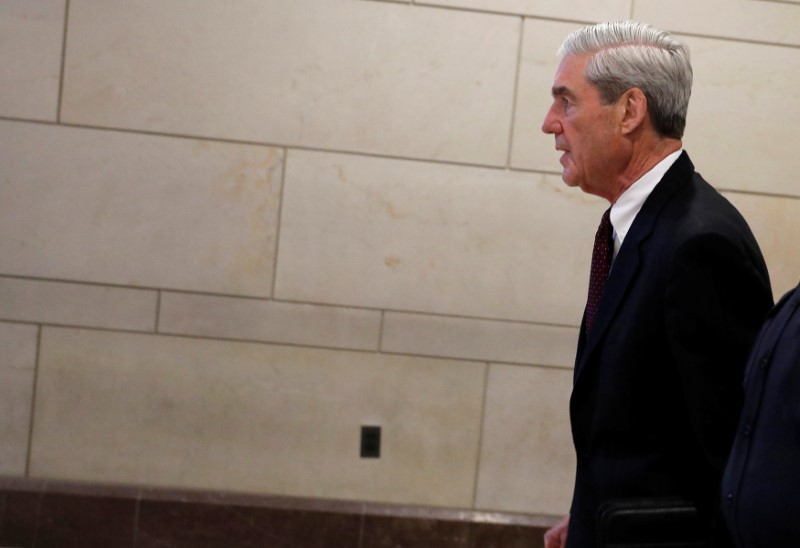By John Whitesides
WASHINGTON (Reuters) - The investigation into possible Russian meddling in the 2016 U.S. presidential election will enter a new phase as early as Monday, when the first charges resulting from the probe could be unsealed and a target taken into custody.
A federal grand jury approved the indictment on Friday and a federal judge ordered it sealed, a source briefed on the matter has told Reuters, adding it could be unsealed as soon as Monday.
The indictment could mark a dramatic turn in special counsel Robert Mueller's investigation into allegations of Russian interference in the 2016 race and any possible links with officials from President Donald Trump's campaign.
The Russia investigation has cast a shadow over Trump's 9-month-old presidency and widened the partisan rift between Republicans and Democrats.
U.S. intelligence agencies concluded in January that Russia interfered in the election to try to help Trump defeat Democrat Hillary Clinton by hacking and releasing embarrassing emails and disseminating propaganda via social media to discredit her.
Mueller, a former director of the Federal Bureau of Investigation, has been looking into possible links between Trump aides and foreign governments, as well as potential money laundering, tax evasion and other financial crimes, according to sources familiar with the probe. He also is exploring whether Trump or his aides have tried to obstruct the investigation.
Mueller was appointed to lead the investigation a week after Trump's May 9 firing of FBI Director James Comey, who was heading a federal probe into possible collusion with Russia. Trump initially said he fired Comey because his leadership of the FBI was inadequate. In a later interview with NBC, he cited "this Russia thing" as his reason.
Trump has denied the allegations of collusion with the Russians and called the probe "a witch hunt." The Kremlin also has denied the allegations.
On Sunday, Trump tried to shift the focus back to Democrats and Clinton, tweeting that the Russia issue was being used to sidetrack the Republican push for tax reform and praising Republican "anger and unity" on the need to look into whether Democrats and the Clinton campaign paid for a portion of a dossier that detailed accusations about Trump's ties to Russia.
Special White House counsel Ty Cobb said the president's tweets "are unrelated to the activities of the Special Counsel, with whom he continues to cooperate.”
PRIEBUS, SPICER AMONG THOSE INTERVIEWED
Investigators led by Mueller have interviewed former White House chief of staff Reince Priebus, former spokesman Sean Spicer and other current and former White House and campaign officials.
In July, FBI agents raided the Virginia home of Trump's former campaign manager Paul Manafort, whose financial and real estate dealings and prior work for a pro-Russian political party in Ukraine are being investigated by Mueller's team.
Mueller also has investigated Michael Flynn, an adviser to Trump's campaign and later his national security adviser. Flynn was fired from that post in February after misleading Vice President Mike Pence about the extent of his conversations with Russian Ambassador Sergei Kislyak last year.
The indictment in Mueller's probe was first reported by CNN, which said the target could be taken into custody on Monday.
That possibility spurred some of Trump's conservative allies to call for Mueller's firing. Sebastian Gorka, an outspoken former adviser who left the White House in August, said on Twitter that Mueller "should be stripped of his authority" and investigated if he executed warrants in the probe.
The White House said in the summer that Trump had no intention of firing Mueller even though he questioned his impartiality.
Republicans also criticized leaks to the press about the indictment and raised the possibility that those responsible could be prosecuted.
But Republican Senator Rob Portman said on NBC's "Meet the Press" that Trump had been "too defensive" about the Russia probe. He said there should be broad outrage about Russia's attempted meddling.
